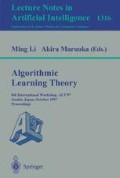Abstract
This paper describes an approach to learning from noisy examples with an approximate theory. The approach includes a theory preference criterion and an overfitting avoidance strategy. The theory preference criterion is a coding scheme which extends the minimum description length (MDL) principle by unifying model complexity and exception cost. Model complexity is the encoding cost for an algorithm to obtain a logic program; exception cost is the encoding length of the training examples misclassified by a theory. When the system learns from the remainder of the training set, it adopts a kind of overfitting avoidance technique, induces thus more accurate clauses. Accounting for the above cases, our approach appears to be more accurate and efficient compared with existing approaches.
Preview
Unable to display preview. Download preview PDF.
References
D. Angluin and P. Laird. Learning from noisy examples. Machine Learning, 2:343–370, 1988.
N. Lavrac and S. Dzeroski. Inductive learning of relations from noisy examples. In S.H. Muggleton, editor, Inductive Logic Programming, London, 1992. Academic Press.
C. R. Mofizur and M. Numao. Learning simple recursive concepts by discovering missing examples. In PRICAI'96: Topics in Artificial Intelligence, pages 360–371. Springer Verlag, 1996.
S. Muggleton. Inductive Logic Programming. Academic Press, 1992.
S. Muggleton. Inverse entailment and progol. New Generation Computing, 13:145–186, 1995.
S.H. Muggleton, A. Srinivasan, and M. Bain. Compression, significance and accuracy. In Proc. Ninth International Conference on Machine Learning, pages 338–347, San Mateo, CA, 1992. Morgan Kaufmann.
M. Pazzani and D. Kibler. The utility of knowledge in inductive learning. Machine Learning, 9(1):57–94, 1992.
M.J. Pazzani, C.A. Brunk, and G. Silverstein. An information-based approach to integrating empirical and explanation-based learning. In S. Muggleton, editor, Inductive Logic Programming, London, 1992. Academic Press.
J. R. Quinlan. The minimum description length principle and categorical theories. In Proc. of 11th International Conference on Machine Learning, pages 233–241. Morgan Kaufmann, 1994.
J.R. Quinlan. Learning logical definitions from relations. Machine Learning, 5(3):239–266, 1990.
J.R. Quinlan and R.D. Rivest. Inferring decision trees using the minimum description length principle. Information and Computation, 80:227–248, 1989.
B. L. Richards and R. J. Mooney. Automated refinement of first-order Horn-clause domain theories. Machine Learning, 19:95–131, 1995.
J. Rissanen. A universal prior for integers and estimation by minimum description length. Annals of Statistics, 11:416–431, 1983.
J. Rissanen. Stochastic complexity and modeling. The Annals of Statistics, 14:1080–1100, 1986.
C. Schaffer. Overfitting avoidance as bias. Machine Learning, 10:153–178, 1993.
S. Tangkitvanich and M. Shimura. Learning from an approximate theory and noisy examples. In AAAI 93, pages 466–471. AAAI press/The MIT Press, 1993.
J. Wogulis and M. J. Pazzani. A methodology for evaluating theory revision systems: Results with Audrey II. In Proc. of 13th International Conference on Artificial Intelligence, pages 1128–1134, Chambery, France, 1993.
X. Zhang and M. Numao. Efficient multiple predicate learner based on fast failure mechanism. In PRICAI'96: Topics in Artificial Intelligence, pages 35–46. Springer Verlag, 1996.
Author information
Authors and Affiliations
Editor information
Rights and permissions
Copyright information
© 1997 Springer-Verlag Berlin Heidelberg
About this paper
Cite this paper
Rang, X., Numao, M. (1997). Learning and revising theories in noisy domains. In: Li, M., Maruoka, A. (eds) Algorithmic Learning Theory. ALT 1997. Lecture Notes in Computer Science, vol 1316. Springer, Berlin, Heidelberg. https://doi.org/10.1007/3-540-63577-7_53
Download citation
DOI: https://doi.org/10.1007/3-540-63577-7_53
Published:
Publisher Name: Springer, Berlin, Heidelberg
Print ISBN: 978-3-540-63577-2
Online ISBN: 978-3-540-69602-5
eBook Packages: Springer Book Archive

